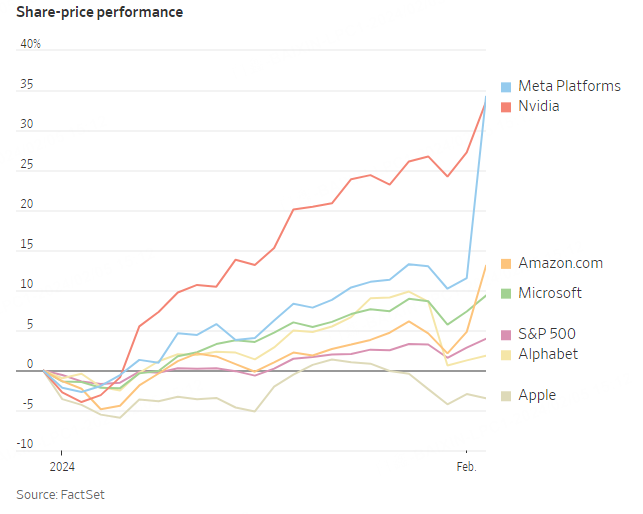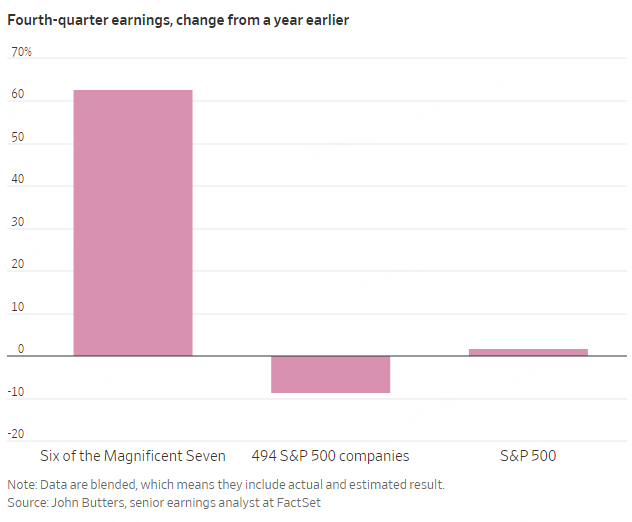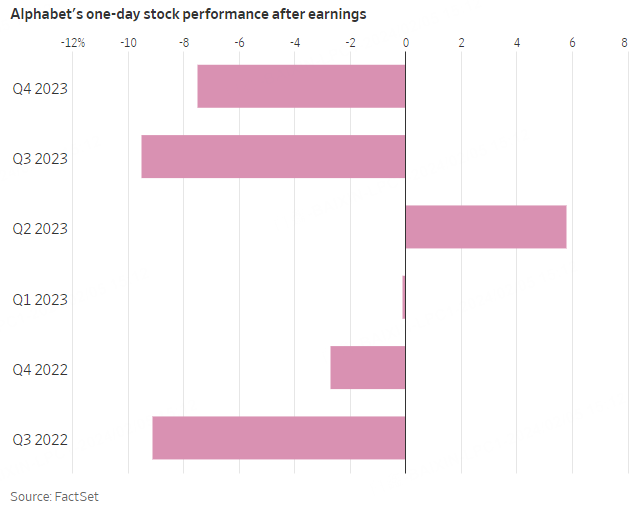Investors have a simple request for tech titans this earnings season: Nothing less than perfection.
The "Magnificent Seven" group of tech companies has been the stock market's biggest engine for growth and profits over the past year. But after five of the companies turned in strong quarterly results last week, investors are being picky about which ones they reward.
Facebook parent Meta Platforms posted its best sales growth in more than two years, initiated its first dividend and boosted its share-buyback authorization by $50 billion. Investors responded by sending shares up 20% to a record on Friday. Amazon.com said robust holiday spending helped its profit soar, sending shares 7.9% higher.
Other stocks didn't fare as well -- despite results that cleared the bar. Google parent Alphabet, Microsoft and Apple reported higher profits and sales than Wall Street had forecast. Their shares nevertheless fell after key business segments failed to perform as well as analysts expected. Alphabet dropped 7.5% the day after its report, its worst session since October, while Apple slipped 0.5%, selling off for the week. Microsoft fell 2.7% the day after its results, before rebounding to end the week up 1.8%.
"It's because there's so many people that have crowded into it -- anything that was perceived to be, 'Well, this isn't completely bulletproof. We're out,'" said George Maris, global equities chief investment officer at Principal Asset Management.
Magnificent Seven shares have surged over the past year, propelled by bets that they would be the biggest beneficiaries of a coming boom in artificial intelligence technology. They have also helped send the overall stock market to repeated records: The S&P 500 is up 4% to start 2024. (The other stocks in the group are Tesla, which reported disappointing results last month, and Nvidia, which is scheduled to report Feb. 21.)
Investors this week will monitor another round of quarterly earnings from companies including Caterpillar and McDonald's, as well as the latest figures on the trade deficit and U.S. service-sector activity.
Analysts say the recent stumbles in the tech sector show that justifying high valuations will prove challenging.
Without the Magnificent Seven, earnings for the wider stock market would look a whole lot worse. Excluding Tesla, the Magnificent Seven are projected to report a 62.8% jump in earnings for the fourth quarter. The other 494 companies in the S&P 500 are expected to post an 8.6% decline. All together, earnings are expected to grow 1.6%, FactSet data show.
The big question for investors: How soon can the spending on AI to build new businesses produce new revenue and profit? So far, the companies have seen little result from their investments.
Tech stocks were also dinged last week by waning hopes for near-term cuts in interest rates. The S&P 500 fell 1.6% Wednesday, its worst day since September, after Federal Reserve Chair Jerome Powell said a March rate cut was unlikely. The index rebounded later in the week after data showed hiring accelerated in January with the U.S. economy adding far more jobs than economists expected. The 10-year government bond yield jumped Friday to 4.03%, the largest one-day gain since September 2022.
Some investors were unfazed by last week's selloffs.
"We're not going to get overly exercised over a short-term negative move unless the fundamentals have really changed," said Nael Fakhry, portfolio manager of the Osterweis Fund, which owns Microsoft, Alphabet and Amazon shares.
Alphabet shares have sold off the day after reporting earnings in five of the past six quarters. But the stock has advanced nearly 50% over the past 18 months, outperforming the S&P 500 by more than 20 percentage points, FactSet data show. Microsoft has sold off four times over the same period.
Microsoft's slip last week came after disappointing earnings from the segment that includes the company's Windows, gaming and device businesses. Alphabet shares declined after the company's ad sales, which account for a majority of its revenue, fell short of analyst expectations. Apple's revenue from China, its third-largest market, was below analyst estimates, as was revenue from its services division.
Some investors warn that buying tech stocks at high prices might yield poor results, even if artificial intelligence lives up to its hype.
"Narratives have the benefit of being largely true," said Rob Arnott, chairman at Research Affiliates, "but they also have the disadvantage of being fully reflected in share prices."




